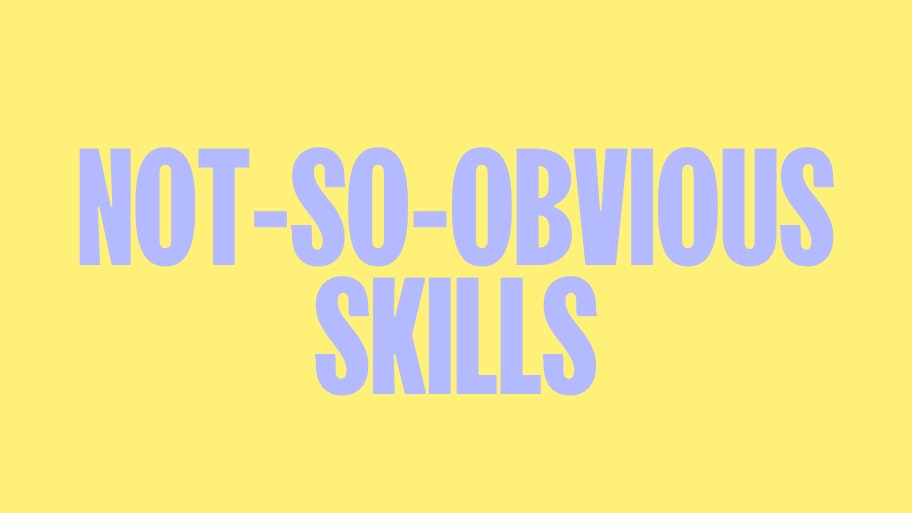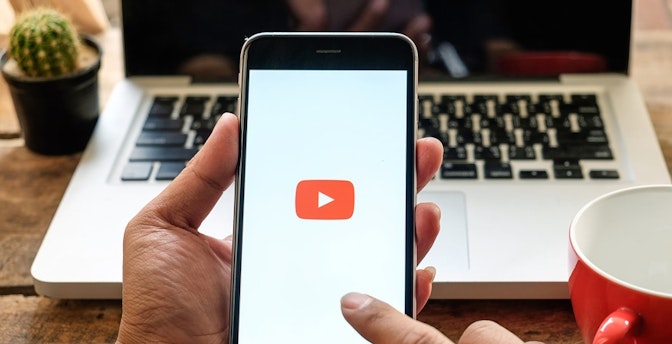We are born tabula rasa. Or, with an empty slate.
Meaning that from early childhood, our core ability to advance in the world is learning.
It starts with modeling people around us, usually family and friends, and copying their behavior, mimicking them.
And slowly but surely, we progress in the world.
The problem is that the curriculum of formal education is outdated in most countries. Modern education is a result of an industrial age and it doesn’t equip young kids and teenagers with much-needed skills that are universal and necessary to advance much more efficiently in the world, whatever their goals end up being.
So, in essence, you are left to your own devices.
This is great because hey, we’re living in the 21st century where you can find almost all human knowledge online.
You just have to be mindful of your intent.
What exactly are you after?
Most skills we possess are divided into soft and hard skills.
Soft skills tend to benefit anyone who acquires them by allowing them to progress in their work, while hard skills tend to be a more specific skill set, depending on the industry, ranging from programming, photography, design, and hundreds of others.
Out of dozens of possible soft skills you can acquire, there are a few that can really make all the difference and make you a more efficient top performer both at work and at home.
At home, you say?
Yes. When you acquire, for instance, communication skills or its subset, let's say persuasion, it will not only help you close more clients, but it can also help you in your personal life, such as when it comes to negotiating a price of an item you want to buy, or if you’re entering a discussion with a family member, the principles of persuasion can be useful there too.
So let’s take a look at ten skills that help performers reach the top.



1. Self-Awareness
Whenever you watch a movie about artificial intelligence, one of the first things you’ll observe is that in the quest to create it, the first sign they look for is self-awareness.
Like robots, you should start here too.
→ Click Here to Launch Your Online Business with Shopify
I’m not talking about some ambiguous, fad-like awareness, but true knowledge of oneself.
Knowing who you truly are, what drives you, what your key values and principles are, and what shaped you into the person you are today is paramount to moving forward and achieving your goals.
Of course, this doesn’t mean that you do this once and you’re done. It’s a process, something you do throughout life.
It’s one of the only ways to remain fully authentic in a hectic world.
Deep exploration of your internal world and making sure to take a beat every once in a while when things get too loud should serve you as your guiding compass.
2. Get Clarity & Learn How To Pivot Accordingly
Know thyself. – Shakespeare
If knowing yourself is your starting point, this is your second stop.
The first step is to make sure you have an understanding of yourself, which is crucial in determining your short-term and long-term direction in life.
Your values, principles, and all the nitty-gritty deep down inside you is what will define your goals.
Unfortunately, today, the times are so uncertain, and setting any long-term vision for yourself isn’t smart as circumstances shift and change even on a daily basis.
However, this shouldn’t stop you from defining one- to three-year goals, and then defining what high-leverage activities you need to execute that will help you make the most progress.
The next step is to monitor your progress and adapt or pivot your goals accordingly.
Sometimes, your plan may not align with the timeline of your goals, so you need to adjust it, while other times, you will achieve your goals faster, so you need to set new ones.
Keep in mind that there are two types of motivation you can have: external and internal. The first is driven by external rewards, and any major goal is usually not strong enough to make us persist, so you should rely on the internal one and know what your “why” is – for wanting to achieve the goals you’ve set for yourself.

3. Comprehensive (Speed) Reading
This is a double-edged sword.
When I was in high school, I trained myself in speed reading in order to be able to consume more books and information in general, and for a couple of years, it worked wonders for me.
→ Click Here to Launch Your Online Business with Shopify
You see, the average human reads at about 150–250 words per minute, while I was at 700-ish.
This is great when you’re reading casual books. But later on in university when I started having classes such as neuro-psychology, going through technical aspects wasn’t something you should speed read through.
Think of it as the speed in your car.
Once you learn it, depending on your needs, you can speed up or slow down your reading.
In general, this applies not only to the reading aspect but the overall information intake.
Next to speed reading is the comprehensive part, which fundamentally means that you shouldn’t randomly consume whatever manages to grab your attention, but to have a more intentional approach. If you take a book, go in deep. What is it that you want out of it? What’s at least one idea that you want to have as an outcome of finishing that book? Go through the table of contents, check out the flow (there’s usually a logic behind it), and see what you can expect. This goes not only for books but for the online world as well. Choose what websites you visit carefully and what type of content you go through.
Direct yourself to go to websites that support your goals and interests.
4. Memory Improvement
This might seem outdated, especially when we can use devices to help us store information. But until technology fully replaces us, we should strive to make the most out of our given memory.
Just like anything else, it can be improved, and you would be amazed at how much and not only that but also how useful it can be in your life.
My suggestion is that you take a look into your memory palace, which is, you know, what Sherlock Holmes uses to store vast amounts of useful information and have them ready for use as they are organized efficiently.
In my experience, out of all the memory techniques, this is the one that is the most effective, although it requires the most time to “set up” and use habitually.
Now, even though I said that technology shouldn’t be your primary way of remembering things, it can serve as your supplementary storage system, or simply put, the way you organize yourself outside of your brain.
But how will this help me out with memory?
Well, not everything is useful enough to be occupying your brain and clogging it. That’s why having a procedure in place for note-taking and using other means such as calendars, to-do lists, and other things will support your short- and long-term memory is the most efficient two-way approach you can have.
5. Accelerated Learning (AKA Rapid Skill Acquisition)
I was always split between calling this skill the master of all skills, or productivity.
Productivity lets you take control over your time, the most valuable asset you will ever have, one that is running out without a chance of replenishing it.
Accelerated learning (or learning in general), on the other hand, is the skill that makes us. Because ever since we were kids, the way we’ve advanced in the world is by modeling and acquiring information from around us.
The same goes for when we are adults, it’s just a matter of choosing the right skills for you.

Anyone who takes their life or business to the next level is required to have as much control as possible over their learning.
The easiest way to get yourself back on track, or to keep up with one, is to make sure that you make your learning supplementary to your goals, as any skill is simply a how-to for achieving progress toward your goals.
Each goal is a set of activities you are supposed to do. If you want to execute those activities, you need to learn how to do them, ergo you need to acquire specific skills for that type of activity.
6. Productivity (Efficiency and Effectiveness)
This one is simple.
When talking about productivity or time management, we generally think of work- or business-related things.
→ Click Here to Launch Your Online Business with Shopify
However, it’s far more simple and important than that.
It’s about death.
You’re not quite sure when it will happen. Thus, you should do whatever you can to unleash your potential. And your operating unit is one single day.
The goal is to have as many good days as possible.
This should be the number-one skill to be mindful of. As time is our most valuable resource, you need to learn how to direct it into things that will yield the biggest return on investment.
It’s important that you have clarity (which goes back to the first skill we mentioned) about what it is you want to accomplish in your life.
Then the follow-up question becomes how you need to use your time daily to make progress towards your goals.
7. Habit (Elimination and Formation)
I won’t go with the cliché here from Aristotle about habits and excellence.
However, I will say that it’s not far off.
The only problem, just like with the information above, is that you have too many choices.
At any given moment, you can start forming a number of habits that will drastically improve your life, and I’d assume that there are also a few that will continue to improve your life even if you drop them.
That’s why you need to carefully select the ones that will help you craft the best (not the most perfect) repeatable day.
What are the habits and behaviors that you should phase out or at least reduce, and what are the ones that will help you build a healthy life?

Try to find one that is fundamental, which will serve as the cornerstone for every other positive thing you want to do continuously.
From then on, figure out what the most essential habits for each area of your life will be (i.e., relationships, health, career/business). Slowly and gradually, start adding them one by one, as if they are a part of your identity and not some task on a to-do list you HAVE to make yourself do.
8. Flow on Command
Ah, the age of distraction.
It sort of reminds me of the time in high school when I had no direction in reading, so I read anything from Russian literature to Twilight, Harry Potter, sci-fi, novels, and a number of self-improvement books.
→ Click Here to Launch Your Online Business with Shopify
Most people do what I do but on the internet, where they consume whatever attracts their attention, without any actual intent.
This is not an issue when you do it for a limited time. But if most of the time you spend online is spent randomly, then that becomes a problem.
It’s crucial that you define what interests and goals you have, and what type of content and topics will help you tap those interests and help you progress towards your goals faster.
Each one of us has a specific ritual for getting into the zone. Whether or not we are aware of it is another matter.
Just like anything else we do in life, we have a recipe for getting into the zone or the state of flow, and that recipe is something we can customize for ourselves.
You know what I am talking about…
When you engage yourself in a high-leverage activity that you know will take you closer to your goal, and after a while, you go deep into that obsessive state of focus, and suddenly three hours later, you raise your head up, and the task is complete. Time flew by without you even noticing it.
For most people, this state of flow is random, and it rarely happens.
But for those who want to go further in life, they should learn how to get into this state on command as this is the most productive mental state anyone can be in.
Start by clearing out your environment (make sure that there are no distractions), then take care of your computer and make sure it’s decluttered. Try to stay away from your phone. Ideally, you’d want to place it out of reach, with notifications turned off.
Also, experiment with music. It’s known to have quite a high correlation with the flow.
If you’re still unsure as to what can make you THAT focused, try to ask yourself: When was the last time you were deeply immersed in something you were doing? What helped you reach that zone, and how can you replicate it?
As you do it more often, just like anything else, you’ll become better at it.
9. Networking
Even with the advances of technology making it easier to connect, reach out, and stay in contact with not just people close to us, but people all around the world, it somehow seems that people are growing more apart.
You are the average of the five people you spend the most time with. – Jim Rohn
Luckily, all these technologies have an upside to them; they allow you to “stalk” people, research them, reach out, and develop and maintain contact with them.
However, this is only one side of the coin.
You have to get good not only at finding and meeting the right people for you but also learn how to consistently and intentionally maintain contact with people you deem valuable.

It’s important that you build a system for yourself that will allow you to do this automatically, instead of finding yourself, three months from now, having not maintained a relationship, be it personal or professional.
This can range from creating a spreadsheet for yourself, with the names of literally anyone in your life and how often you want to communicate with them, to simply putting a reminder in your calendar to reach out to them after a specific time.
Keep in mind that most of life’s joy, as well as professional progress, comes from interacting with like-minded people that have an ambition and a drive to achieve more in life.
I’d make a final note here and say that in order to keep your personal network healthy, you should also probably do a bit of selection. Do a brief analysis of people currently in your life and make sure that there aren’t any toxic people that are making everything more challenging.
10. Assertive Communication
Winston Churchill had a quote about tact, he said:
Tact is the ability to tell someone to go to hell in such a way that they look forward to the trip.
Here, I am not implying that your job is to arm yourself with words so you can make sure that anyone that crosses you finds themselves in your crosshairs.
→ Click Here to Launch Your Online Business with Shopify
The goal here is to learn how to stand up for yourself and learn how to communicate what you represent – your ideas, principles, beliefs, and convictions.
On top of this, it’s about being able to sell yourself and whatever you end up creating.
When working with people, you’ll need to learn how to assertively communicate these to people around you.
It’s also important to be mindful of the situation and be aware of when you need to stop pushing and when someone else’s idea is better.
Here, it’s often stated that introverts are less assertive. But the reality is that if you treat introversion and extroversion as a spectrum, and not just two disconnected things, you can remind yourself that you are free to up and down that spectrum, depending on the need at the given moment.
Being assertive will increase your skill in persuasion and negotiation. As you learn how to stand up for yourself, it will, by default, help you in other aspects of the communication cluster of mini-skills.
Final Takeaway
Each one of these skills, just like skills you have already acquired throughout life, is connected, and whenever you acquire another one, you get a compounding effect.
Then everything becomes easier until it finally reaches the point when you are aware of how to use these things you’ve learned to achieve anything in life.






